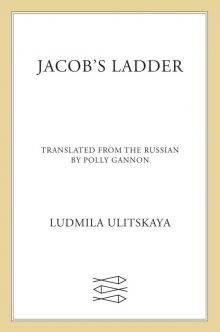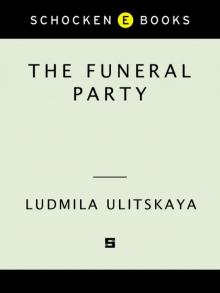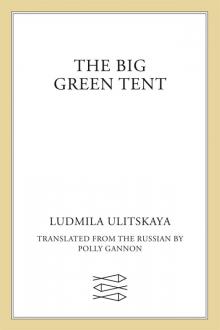- Home
- Ludmila Ulitskaya
Life Stories Page 8
Life Stories Read online
Page 8
Nelya told him that her personal habitat was located inside herself, not outside, but he didn't care to get into details and wasn't willing to meet her halfway. Proving, by that very act, that Nelya was right a thousand times over to think of him as a callous person who was not beautiful in any sense of the word.
But Nelya hadn't the slightest suspicion that she would get nothing from their maternity ward nurse, Miss Polya, the one who had advised her to use earplugs in the struggle against noise. She told her, Miss Polya, everything about her hopeless situation, and didn't hide a thing—she told her both about the music, and about the way she was walking her feet off, looking for earplugs everywhere she could, and said, "Lend me just a dozen of them, of those earplugs, Miss Polya, just to get by for a little while, and I'll pay you back. With interest."
But Miss Polya answered her like lightning out of the clear blue sky: "I can't," she said. "I myself have an insufficient quantity," she said.
Nelya tried to explain convincingly that she couldn't exist, wasn't capable of it, without earplugs and said, "They create the music of the spheres inside me."
Miss Polya said, "What about me? What do they create for me, chopped liver?"
So, after that conversation had taken place, Nelya's spirits fell and she lost heart. After all, her final set would become unfit for use if not today, then tomorrow, and she'd have to take them out. And there was nowhere to get more new ones. And that meant that the end of her music, and of beauty as a whole, was coming implacably closer, and so, her own final and irrevocable end was coming. She did live by beauty alone, nothing else, and taking it away would be just the same as killing her.
And she couldn't forgive herself for not thinking to buy ten or fifteen cases of earplugs and not spending all her strength and using all her means to create an inexhaustible supply of them, so that she'd have more than enough, have them up to her eyebrows, enough to last her whole life, with some left over for the people who'd come after her and take her place. "But who knew," Nelya thought, justifying herself, "who knew that they had that kind of side effect? Nobody knew. And it was impossible to guess or foresee that there wouldn't be a single one left in the drugstores." Because, in life, there is a lot of stuff that it's simply impossible to foresee. Well, you can't foresee practically anything, if you think about it. Who could've foreseen that, let's say, an ordinary ring of the doorbell would turn out to be what these days they call a fateful event and a turning point, and also a new stage of life? Nelya, hearing the doorbell ring, not only didn't foresee anything, she didn't guess anything, either. She turned the key indifferently in the lock and opened the door to her apartment. On the threshold stood the unforgettable Vasya Bratus, the man himself...
He stepped over the threshold and said, a little hoarsely, "Well," he said, "I've come back home to you after many days and nights. And in those years I was married seven times, in addition I had a wide variety of unofficial female friends and companions, some with a sense of humor, some with other strong sensibilities, but I've never met or known anyone better than you."
So Nelya said, "I'm boundlessly happy to hear that, Vasya, but you're too late, since I don't have any earplugs. And without them life isn't life for me, and you, Vasya, aren't Vasya."
Vasya, of course, didn't understand what she was talking about, and said, "What earplugs are you talking about?"
"The ones that protect people's ears from various noises and troubles, the ones that have disappeared from all the local and even the regional drugstores like the earth swallowed them up," Nelya explained to him.
"Oh, those," said Vasya. "But what do you need a drugstore for?" he said. "Out there at the mill we're up to our asses in earplugs, if you'll pardon my French."
Nelya heard Vasya's words and didn't believe them, saying, "Is that true?"
"It's not just true," said Vasya Bratus. "It's absolutely true."
And then Nelya took him in her arms and hugged him and said, "Bring some. Bring some right now, without delay."
"You want it now, you got it now," said Vasya, "all the more so since my faithful bicycle is down below, chained to the gas pipe."
"Just bring a lot of them, a whole lot of them, so that there'll be enough for me, and for our kids, and for our grandkids—enough for everybody."
So Vasya, who still hadn't understood a thing, sprang onto the bicycle seat, and the pedals and spokes started flashing under him, and his bicycle carried him off in the direction of the mill with the maximum possible speed.
And Nelya, for the moment still Yavskaya, on the threshold of the triumphant return of both Vasya and love into her life, walked up to the window and looked down through it at the road, and she also started to wait, and hope, and, of course, believe. Although she didn't quite know what in, yet.
Translation by Anne O. Fisher*
*I thank the following for their help with translations: Alice Ritscherle, Lars Fogelin, Christa Craven, B., volume editor Paul Richardson, and the volume's collective of translators.
Notes for Earplugs
1. The last name "Yavskaya" is based on the word "yav," reality.
2. An 1801 portrait of a young woman drawing; long attributed to the French master Jacques-Louis David (1748-1825), it was correctly identified in the 20th century as the work of an accomplished but less recognized female painter who studied under him, Constance Marie Charpentier (1767-1849).
3. The reference is to Viktor Vasnetsov's (1848-1926) famous 1898 painting Bogatyry (Medieval knights), portraying the three warrior heroes of Russian folklore, Alyosha Popovich, Dobrynya Nikitich and Ilya Muromets.
4. Viktor Vasnetsov (1848-1926) was well known for his works on Russian mythological and historical subjects; Alyonushka shows the folktale heroine Alyonushka alone in the forest, pining for her bewitched brother.
5. The Dutch artist Rembrandt (1606-1669) painted several portraits of his wife Saskia van Uylenburg (1612-1642) after their marriage in 1634.
6. Aleksandr Shilov (1943- ) is a much-decorated contemporary Russian artist (made a People's Artist of the USSR in 1985, and has been a member of the President of the Russian Federation's Committee on Culture and the Arts since 1999); Morning depicts a young mother breast-feeding her baby.
7. This portrait of a young girl by Rubens (1577 1640) is widely interpreted as a tribute to his daughter, who died in 1623 at twelve years of age.
All Alone
(An Excerpt)
Eduard Limonov
The old woman lay on the couch. She looked like an oversized crust of black bread that had been left in the sun for too long. She was black and, in some places, yellow. Her mouth was half-open, with broken pieces of metal teeth sticking out. Her jaw was held in place by a head scarf, but it didn't keep her mouth shut. The problem was that the old woman had died alone. There was no one with her. She died with her mouth open. The nurse who found her in the morning tried to close her mouth, but by then it had been too late. The old woman looked like the corpse of another old woman which he had seen a long time ago at a body identification center outside Vukovar, Serbia. That old woman, though, had been tortured before she died.
This old woman was his mother. It was his fault that the corpse lay there with its mouth open. If he were a good son, he would have been there with her when she died. He would have held her hand. He would have closed her mouth. But he was a bad son and that was why he only got there in the morning.
He was lucky to be able to come at all. Both Russia and Ukraine were kind enough to let him through the border. They could have easily not let him through, Russia because a court had ruled that he owed Mayor Luzhkov 500,000 rubles and the police could now stop deadbeats from leaving the country, and Ukraine hadn't let him on its soil for the past decade. His name had been on some blacklist or other, along with the names of other enemies of Ukraine, but about six months previously the list had been abolished.
The last time he spoke to his mother was six days ago, on International Women's Day. She managed o
nly three short sentences that made any sense. The rest was the babble of her subconscious. Her last words were "Where's Bogdan?" His mother had lost her mind a couple of months before, but she had not lost her metaphysical connection with her grandson. She asked the right question: "Where is my grandson?" He, her son, had lied to her that his wife and child were staying with the other grandmother in Togliatti, yet the truth was that her only, late-born grandson was who the hell knows where, at the other end of the globe, in Goa, the capital of hippies and druggies. He had been taken there by the wife of the man who now stood over the corpse of his mother. That wife of his had suddenly turned into a werewolf. The old woman's grandson had been there for two months, staying with who knows what kind of people. Besides, his wife was once again pregnant, in her fifth month. His wife's behavior was irrational and therefore a danger to all. The old woman sensed a metaphysical tremor in the part of her no longer functioning brain that was responsible for Bogdan. "Where is Bodgan?" she asked. Not "How is he?", but "Where is he?" It was the right question.
He who stood over the corpse was not only the son of the dead old woman, the father of the kidnapped child, and the husband of the beauty who had turned into a werewolf, but also the head of a banned party, its founder and, for the past 15 years, its irreplaceable leader. He belonged to the party more than to his mother, his wife and his child. True, he had left his mother and father a very long time ago, in 1964, but what about his child? Or his wife? His wife had gradually grown estranged from him. In the end, she literally renounced him, the way wives used to renounce husbands who had been declared enemies of the people. She hardened against him to the point of inexplicable hatred and, finally, took her son and fled to a land without meaning, a place where there were more trivial Russians than gray-skinned Indians. What was she doing over there all that time? He hoped that she would be sensible enough to stay away from drugs—she was pregnant, after all. Yes, he hoped this, while recognizing that it was not in her nature to be sensible.
Yes, the party. Party members died and went to jail for a cause which he had started in prison. They were closer to him than was his beautiful wife, who had turned into a werewolf.
Women—neighbors and nurses—pulled the pillows out from under the corpse. His bodyguards, who had come with him from Moscow, lifted the light corpse of the old woman together with the blanket and carried it downstairs. There, by the front door, a light, flimsy casket rested on two stools. They placed the corpse and the blanket into the casket. They tucked pieces of the blanket under the old woman. The old woman's head rolled to one side and a pillow was called for. They ran upstairs to fetch a pillow. The funeral bus waited patiently. Several old women and men came over and leaned over the casket. As was customary, they received sweets from a bowl.
While they were fetching a pillow, he looked around and smelled the air. Spring had already arrived and the smell was damp, like between a woman's legs after she had been impregnated. The building was the residence of poor people, common people—the entire suburb of New Houses was the same. His parents had lived there for forty years. What did they do all those years? They ate, they bought clothes, they planted potatoes and they continually fixed the roof, since their apartment was on the top floor. Yuck. What a repulsive life they led, a life without events. What a smart kid he had been to run away from his hometown without so much as a backward glance, not knowing why, but following his instinct. What a clairvoyant he was, what a genius, to have run away. How well he had arranged everything. It started to rain. It wasn't raining hard, and they didn't cover the old woman's face.
They brought down a pillow and placed it under the old woman's head. It took a long time to arrange her head, which refused to lay straight. When she was alive, his mother hadn't worn headscarves, but now she had on two: one on her head and the other supporting her jaw. She would have objected to scarves, had she been arranging her own funeral. She wore hats, but a hat would look odd on a corpse. His mother wore lipstick and nail polish until her last months. In the clinic where he had spent the night, there was a bottle of nail polish next to the night table. Had she been arranging her own funeral, his mother would have certainly put on lipstick and painted her nails.
"Are you finished?" asked the bus driver. He was also the only undertaker and gravedigger. Some 13 15 people, including him—the old woman's son—his three bodyguards, a colonel friend of his and another friend, a connected local businessman who had spent an impressive number of years behind bars, the nurse and the neighbors, conceded that they indeed were finished. The driver took out the casket top from the back of the bus and covered the old lady. There were two nails prepped on both sides of the casket top. Very skillfully, at an appropriately tragic, measured pace, the undertaker drove the nails into the casket. He drove them in with style, not with small neurotic taps but confidently and sternly, several precise strikes for each. The knocking of Fate. The sound of Destiny. His bodyguards lifted the casket and slid it into the bus. He tried to offer a hand to 76-year-old Aunt Valya, to help her into the bus, but the driver halted him sternly:
"Not from here. A bad omen. Enter through the side door."
They entered the bus. His bodyguards, the nurses, Aunt Valya, two neighbors, one of whom had swollen feet. The rest piled into the connected man's Chevrolet. The driver started softly and drove competently, brushing aside space.
He stared at the casket, in which the physical body of a woman who gave birth to him 65 years ago flowed away. She had called on his 64th birthday, but by the time he turned 65 she had forgotten who he was. When he called her to congratulate her on Soviet Army Day, she mumbled something unintelligible into the receiver and then suddenly said:
"Tell him his father is dead."
"Mom, it's me, your son," he said. "Father died four years ago."
"Yes, yes, make sure you tell him," she replied, and he hastened to put an end to the conversation. It was disconcerting to be staring into the depth of her abyss.
And now her final journey. Apparently, he felt the same way common people feel on such occasions, but because he wasn't quite a common person, he didn't feel it deeply. Not to tears. Not to goose bumps. Had he been drunk the night before, the odd tear might have flowed over his eyeball, causing him to blink it away, but he hadn't had an occasion to drink much. Even more than sadness (and he was indeed sad) he felt a sense of accomplishment, because the corpse had been successfully removed from the apartment and he was now going directly to where corpses were meant to be, to the crematorium-columbarium. He had almost completed what he came there to do.
He briefly reviewed the years they spent together. There was no sadness there. There was his young father and he, a remote and probably unpleasant child, even though he was undeniably smooth and, as they liked to say now, charismatic. It was the same way Bogdan, his late-born son, was likely to turn out—a stranger to all, yet seductive at the same time... He noted that a piece of carnation stuck out from under the cover of the casket. And a piece of blanket, a camel-hair blanket of the kind they no longer made. The blanket would be burned along with her and would mix with her ashes. There would be very little ash. His mother had shrunk to just thirty-odd kilos by the end. All of a sudden he felt relieved. A strange biological freedom intoxicated his lungs. It's all over, I'm all alone. All alone. All alone. Like a deep sea diver whose cables have been cut, I can swim wherever I want.
"Where are you going to swim?" he parried in an inner debate. "Why now? You have been free from them for a long time. You cut all the cables a long time ago. The old woman who died in a Ukrainian town was but an episode in your kinetic life. You have buried kids, what does the death of an old woman mean to you? Only last December you stood in a snow-covered cemetery in Serpukhov, outside Moscow. The coffin of a party comrade was lowered into the frozen earth. He was not even 23 years old. He had been killed by the police because he was a member of your party. They had cracked his skull open with a baseball bat. At the cemetery, you sobbed silently, you snif
fed softly to make sure no one noticed. There were reporters there, after all. You couldn't really cry, could you, the iron leader of a banned organization? You sobbed. Yes, you did sob. No one heard you. But now, you're bringing nothing but old memories to the crematorium."
His bodyguards were silent. The women yakked nonstop about the price of cremation, which had risen, and then shifted to price increases in general. Russian women—and Ukrainian women, too—are highly effective when they come into contact with death. They know all the customs and they aren't squeamish about washing the body of a dead person and dressing it. When he and his bodyguards arrived from the train station, an entire female platoon had been busy in the tiny kitchen, tapping a tattoo with their knives, preparing salads. The corpse lay already all dressed and packaged.
They required neither asking nor hurrying. Without a thought of payment, only because they enjoy life of which death is an integral part, they gladly wash, dress, slice, cut, boil potatoes and prepare herring. By the time he got to the apartment, they had already bought ten bottles of vodka and some wine. He stared at them in amazement, as though they were some unknown tribe. Can it be that Russian women disdain everyday life and only like parties? Death is a party of sorts, too. Would they have liked to have a funeral every day?

 Jacob's Ladder
Jacob's Ladder Life Stories
Life Stories The Funeral Party
The Funeral Party Medea and Her Children
Medea and Her Children The Big Green Tent
The Big Green Tent